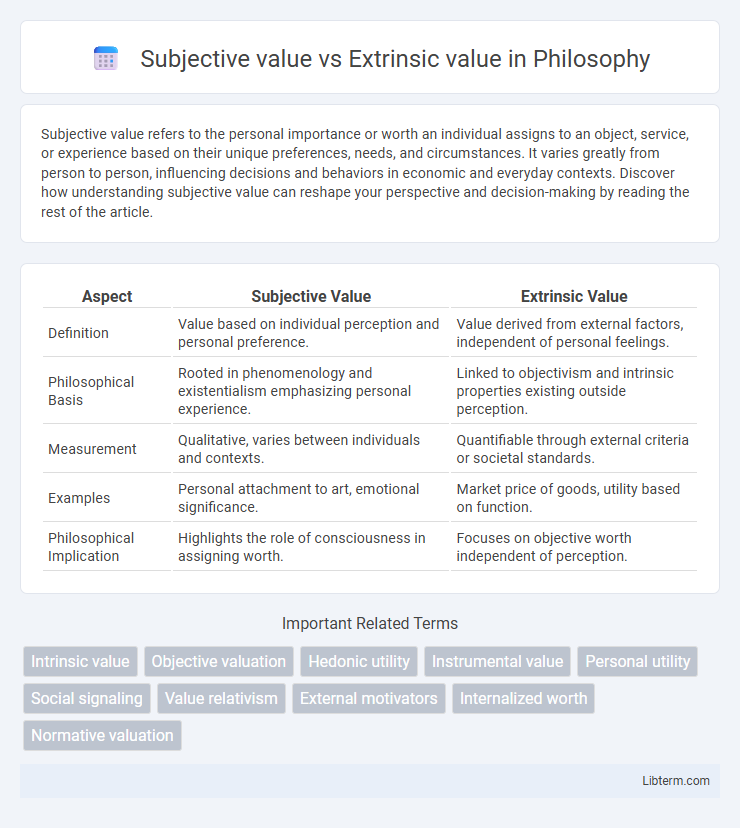Subjective value refers to the personal importance or worth an individual assigns to an object, service, or experience based on their unique preferences, needs, and circumstances. It varies greatly from person to person, influencing decisions and behaviors in economic and everyday contexts. Discover how understanding subjective value can reshape your perspective and decision-making by reading the rest of the article.
Table of Comparison
| Aspect | Subjective Value | Extrinsic Value |
|---|---|---|
| Definition | Value based on individual perception and personal preference. | Value derived from external factors, independent of personal feelings. |
| Philosophical Basis | Rooted in phenomenology and existentialism emphasizing personal experience. | Linked to objectivism and intrinsic properties existing outside perception. |
| Measurement | Qualitative, varies between individuals and contexts. | Quantifiable through external criteria or societal standards. |
| Examples | Personal attachment to art, emotional significance. | Market price of goods, utility based on function. |
| Philosophical Implication | Highlights the role of consciousness in assigning worth. | Focuses on objective worth independent of perception. |
Understanding Subjective Value: Definition and Origins
Subjective value refers to the importance or worth an individual assigns to an object, service, or experience based on personal preferences, emotions, and specific circumstances rather than inherent qualities. Originating from the Austrian School of Economics, particularly from Carl Menger and Friedrich von Wieser, this concept contrasts with extrinsic value, which is determined by objective measures like market price or utility. Understanding subjective value is crucial in fields like behavioral economics and marketing, where consumer choices are influenced more by personal perception than by quantifiable attributes.
What is Extrinsic Value? A Clear Explanation
Extrinsic value refers to the worth assigned to an object, action, or outcome based on external factors, such as monetary price, social status, or utility in achieving goals. It contrasts with subjective value, which depends on personal preferences and individual experiences. Extrinsic value is measurable and often used in economics and decision-making to assess the tangible benefits that influence choices.
Key Differences Between Subjective and Extrinsic Value
Subjective value refers to the personal and individual importance or worth assigned to an object or experience, influenced by personal preferences, emotions, and individual circumstances. Extrinsic value is the objective worth based on external factors such as market price, utility, or social recognition, independent of individual feelings. The key differences lie in subjective value's reliance on personal perception and internal factors, whereas extrinsic value depends on external assessments and universal measures.
Historical Perspectives on Value Theories
Historical perspectives on value theories trace subjective value to the Austrian School, emphasizing individual preferences and marginal utility in determining worth, contrasting with classical economists like Adam Smith and David Ricardo, who focused on extrinsic value derived from labor and production costs. The marginal revolution in the late 19th century marked a shift toward subjective value, highlighting how personal utility drives market prices rather than intrinsic attributes of goods. This evolution reflects the transition from objective labor theories of value to modern interpretations emphasizing consumer perception and demand.
The Role of Individual Perception in Subjective Value
Subjective value depends heavily on individual perception, as it reflects personal preferences, experiences, and emotional connections that shape how much worth an item or service holds for a person. Unlike extrinsic value, which is derived from objective factors such as market price or utility, subjective value fluctuates based on unique perceptions and individual contexts. This role of perception highlights the importance of psychological and cultural influences in determining value beyond measurable criteria.
How Society Shapes Extrinsic Value
Extrinsic value is shaped by societal norms, cultural trends, and collective beliefs that determine the worth of objects based on external factors like market demand or social status. Society assigns value to goods, services, and symbols through shared consensus, which can fluctuate with changing economic conditions or cultural shifts. This contrasts with subjective value, which is individually determined and varies from person to person based on personal preferences and experiences.
Real-World Examples: Subjective vs Extrinsic Value
Subjective value reflects individual preferences, like how a collector might pay a premium for a rare baseball card due to personal attachment, while extrinsic value is based on external factors such as a stock's market price driven by supply and demand. For instance, gold holds extrinsic value as it is valued for its rarity and industrial uses, whereas a family heirloom's worth is predominantly subjective, influenced by sentimental significance. Cryptocurrency demonstrates both values: its extrinsic value is tied to market dynamics, while subjective value arises from users' belief in its potential and utility.
Impacts on Decision Making: Value in Practice
Subjective value shapes decision making by reflecting individual preferences, emotions, and personal experiences, leading to choices that align closely with one's unique needs and desires. Extrinsic value, grounded in the objective worth of goods or services, influences decisions through market prices, social status, or external rewards, providing a measurable basis for comparison. Balancing subjective and extrinsic values enables more nuanced and practical decisions, optimizing outcomes in purchasing, investment, and resource allocation contexts.
Implications for Economics and Behavioral Science
Subjective value emphasizes individual preferences and personal utility, influencing demand and market dynamics by reflecting diverse consumer choices and psychological factors. Extrinsic value, rooted in measurable attributes like price or scarcity, provides a common metric for economic transactions and asset valuation. The interplay between subjective and extrinsic values shapes behavioral economics, highlighting how perceptions and intrinsic motivations drive decision-making beyond traditional market models.
Balancing Subjective and Extrinsic Value in Everyday Life
Balancing subjective value, which is based on personal preferences and emotional significance, with extrinsic value, determined by external factors like market price or utility, is essential for informed decision-making in everyday life. Prioritizing subjective value ensures fulfillment and personal happiness, while acknowledging extrinsic value supports practical choices and financial sustainability. Harmonizing these values leads to optimized resource allocation and enhanced overall well-being.
Subjective value Infographic

 libterm.com
libterm.com